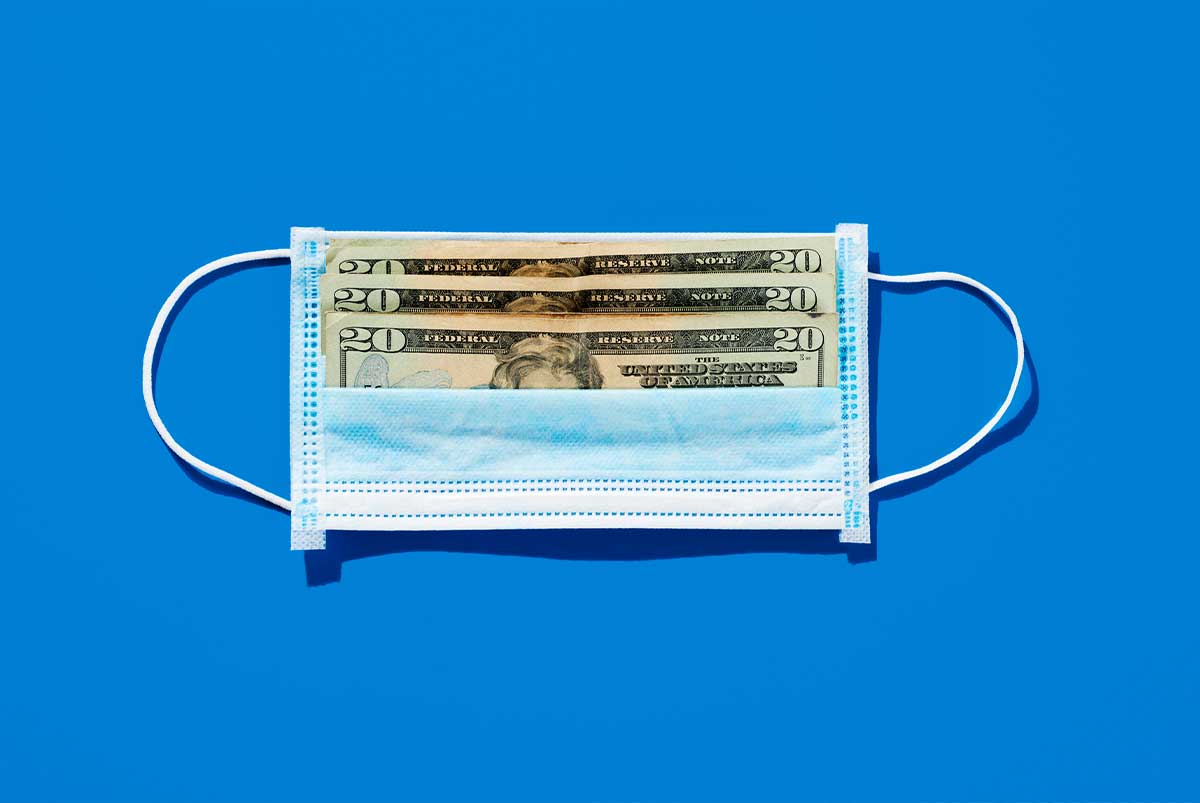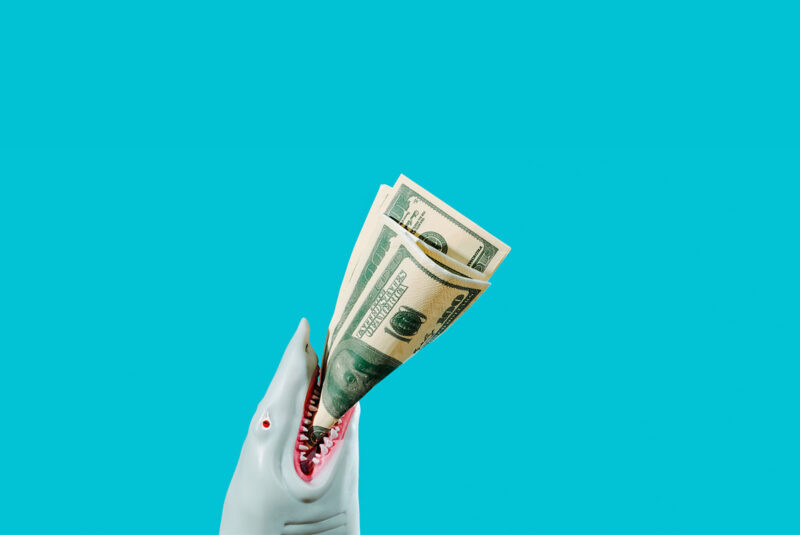Explore your mortgage options
Seeking help for any health issue can be a stressful and scary experience. And figuring out how to pay mounting medical bills can be even more stressful and frightening.
A recent study by the Commonwealth Fund found that 4% – 11% of Americans with employer health insurance had high out-of-pocket costs that climbed as much as $7,500 or more in some areas.[1]
And without health insurance, the costs can be much, much higher.
Fortunately, there are several ways to pay off medical bills. If you need help financing a planned procedure (like fertility treatments) or an unplanned medical procedure (like surgery or dental work), a personal loan could be a good choice for you.
Explore everything you need to know about personal loans for medical expenses in our guide.
Need Cash?
Applying for a personal loan has never been easier. Get the cash you need with competitive terms from Rocket LoansSM.
Checking your options won’t affect your credit score.
What Is a Personal Loan for Medical Expenses?
To take out a personal loan, you apply to borrow money from a lender (think: a bank, a credit union, or an online lender).
If you qualify for the loan, the lender will offer you a quote with details like the loan’s repayment period, the interest rate and whether the interest rate will be fixed or variable.
Can I just use my credit card to pay for my medical expenses?
The short answer is yes. You can use your credit card to pay your medical bills, but that could be a risky option for three reasons:
- You could get in over your head: Medical bills can get expensive. Paying for them with your credit card could potentially make those bills even more expensive and leave you with high-interest debt that’ll be even harder to pay back.
- You might ruin your credit score: Your credit utilization rate (aka credit utilization ratio) is how much credit you’re using compared to your credit limit (how much you have). If you charge too much or max out your card, it can signal to a lender that you’re a high lending risk. And, a low credit score will make it difficult to get a loan (of any type) in the future.
- You might miss out on a longer grace period: If your credit card payment is 30 days past due, the card company will immediately report it to a credit bureau. With medical debt, your past due payment won’t be flagged until it’s sent to collections, which can take up to 90 days.[2]
What types of medical procedures do medical loans cover?
You have the freedom to pay for both emergency medical care as well as elective (or planned) procedures insurance may not cover. Some of these elective procedures include:
- Fertility treatments (like in vitro fertilization)
- Plastic or cosmetic surgery
- Dental work (like orthodontics, veneers or Invisalign®)
- Hair loss/hair replacement treatments
- Weight loss, gastric bypass procedures
Get Cash Fast
Rocket LoansSM offers same-day funding for personal loans. Get prequalified and get the cash you need, fast.
Compare Personal Loan Quotes
Whether you’ve got debt from an emergency surgery or you’re anticipating some expensive medical bills, choosing the right personal medical loan can feel challenging.
To help save you some time (and money!), we went ahead and compiled a list of what you’ll need to consider when you’re shopping for a personal loan.
Application requirements
Before you start comparing lenders, review each lender’s application requirements to make sure you meet the loan’s criteria. Requirements vary depending on the lender, but they can include:
- Credit score: Typically, most lenders require a credit score of 640 or higher. If your credit score falls below 640, a lender may offer you a loan, but the interest rate will likely be higher.
- Payment history: Your history of on-time, late or missing payments goes hand in hand with your credit score. When a lender sees missed payments on your credit report, they may question your ability to make your monthly payments and fully repay the loan.
- Income: The lender will verify how much you make and all of your sources of income. The lender needs to determine whether you have enough money coming in to make your monthly loan payments and any other monthly bills you have.
Annual percentage rate (APR)
Essentially, APR is what you pay to borrow money from a lender. It’s a group of numbers folded into one yearly fee and gets expressed as a percentage. APR usually includes fees like the interest rate, broker fees and discount points.
It’s a pretty important acronym to know and understand. Knowing a loan’s APR can help you make healthy financial decisions.
If you’re deciding between a few personal loan offers, check out the APR and see which loan has the lowest one. Getting a personal loan with a low APR will help lower the total cost of borrowing and help you save money over the life of the loan.
Fixed or variable rates
The interest rate (which is based on a percentage of your loan) is the yearly amount your lender will charge on the money you borrowed. When you’re looking at the details of the loan, you should confirm if the interest rate is fixed or variable.
Many personal loans come with a fixed rate, which means that the interest and your payments stay the same over the loan’s repayment term. Variable interest rates aren’t consistent over the life of the loan. The interest and your payments will rise or fall depending on how the market is doing.
Fixed-rate loans offer many advantages, including set payments over the life of the loan (which will help when you’re creating a household budget) and protection from sudden and potentially large increases in your monthly loan payments.
The starting rate on variable rate loans is typically lower than the rate on fixed-rate loans. Because variable rates are tied to the rise (and fall) of market interest rates, you could end up spending more over the term of your loan.
Secured loans and unsecured loans
There are two types of personal loans: secured or unsecured. You have to offer your lender something valuable (aka collateral), like a house, car, or certificate of deposit to back your secured loan. Unsecured loans don’t require any collateral.
Talk to the lenders you’re considering and ask about their secured and unsecured loan options. (FYI: The interest rates and APR on secured loans are typically lower than they are on unsecured loans.)
Origination fee
The origination fee is a cost some lenders will charge to process your loan once you’ve accepted their offer.
This fee isn’t the same for every loan. It typically depends on how much you’ve borrowed. In some cases, the origination fee is tacked onto your loan balance, but it can also be taken out of your loan proceeds.
Before you commit to a lender, find out whether they’ll charge an origination fee. If they do, ask what the percentage will be and whether it will be folded into your loan balance or be taken out of your loan proceeds.
Loan term
The loan term (read: your repayment period) is the amount of time you and your lender decide it’ll take to pay back the money you borrowed. You must weigh your repayment options when choosing a loan.
While paying a loan over a longer period may make your monthly payments smaller, you should also consider the amount you’d pay in interest over a longer period of time.
Speed
Some lenders can offer funding in 1 – 2 days. Most lenders can get you your money in 1 – 2 weeks.
If you’re in a hurry, do some quick research, or ask lenders how long it’ll take to get through the application process and get a loan.
Alternatives to Personal Loans
While personal loans for medical expenses are a solid choice, you should also consider some of the other available options.
Nonprofit or charity
It might take a bit more research, but there are many financial assistance programs at hospitals and charities at the national, state and local levels that can help you pay your medical bills. How much they can help with your copays, medications, and treatment will vary by organization.
Hire a medical billing advocate
It can be tricky to navigate the ins and outs of the U.S. medical billing system on your own. You can hire someone to be your medical billing advocate.
Your advocate can help with things like reading through your bills to make sure there aren’t any errors and helping to negotiate payment plans. Typically, medical billing advocates charge a percentage of the amount of money they’re able to save you.
Set up a payment plan with the doctor or hospital
Contact the billing department where you got your medical service and ask them about setting up a payment plan.
This is worth the time and effort since health care providers sometimes offer payment plans at a low or 0% interest rate.
Get a medical credit card
If you can’t set up a payment plan with your health care provider – and your options are limited – you may want to consider applying for a medical credit card. Some providers accept these cards to handle ongoing medical costs.
Medical credit cards usually come with a high APR, which can make them pricier than taking out a personal loan.
The Bottom Line on Medical Loans
Getting out of health care debt may seem daunting, but taking out a personal loan can help. While you’re waiting for lenders to get back to you with offers, make sure you’ve done your research, and you’re ready for what comes next.
Get Prequalified for Loans from $2,000 to $45,000
Rocket LoansSM offers personal loans from $2,000 – $45,000. From debt consolidation to unexpected expenses, we’ve got you covered.
Checking your options won’t affect your credit score.
The Short Version
- You can take out a personal loan to cover both emergency care and elective medical procedures
- Paying for medical expenses with a credit card can rack up a lot of high-interest debt
- Not all personal loan lenders are the same – they all have different ways of handling loan approvals
The Commonwealth Fund. “How Much U.S. Households with Employer Insurance Spend on Premiums and Out-of-Pocket Costs: A State-by-State Look.” Retrieved October 2021 from https://www.commonwealthfund.org/publications/issue-briefs/2019/may/how-much-us-households-employer-insurance-spend-premiums-out-of-pocket
HealthCare.gov. “Grace Period.” Retrieved October 2021 from https://www.healthcare.gov/glossary/grace-period/




